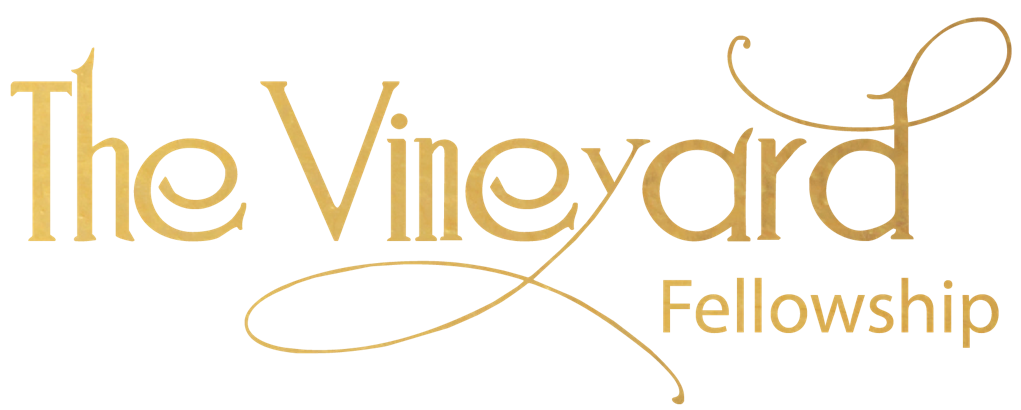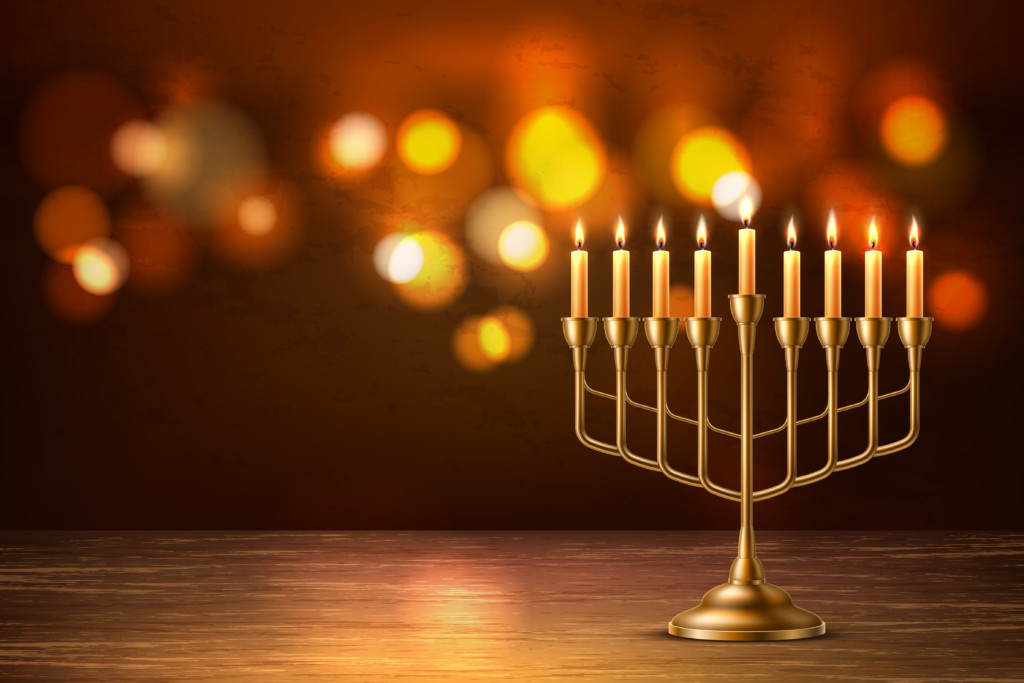Chanukah:
The Feast of Dedication
by: Christine Egbert
Some claim that Chanukah (also spelled in English as Hanukkah with several other variations) isn’t in the Bible but it is. It’s found in the New Testament, in John 10:22 which says, “Now it was the Feast of Dedication in Jerusalem, and it was winter.” If you look up the Greek word that’s translated into English as dedication in Strong’s Bible Concordance (G1456) it informs us that “eng-kah’ee-nee-ah” is the neuter plural of a presumed compound from “innovatives” that is renewal of religious services after the Antiochian interruption: dedication.”
Chanukah, which in Hebrew means “dedication”, commemorates the rededication of the Temple after Antiochus desecrated it by sacrificing a pig on the LORD’s (Yahweh’s) altar. Here is a recap of Israel’s history between the end of the Old Testament and the beginning of the New: Alexander the Great conquered Syria, Egypt and Palestine. But under his rule, the Jews who returned from their captivity in Babylon were allowed to practice their religion and retain some autonomy. Many Jews, however, assimilated. They adopted not only the Greek language but Hellenistic culture. Others did not.
After Alexander’s death, his generals divided his empire, and in 175 BCE, Antiochus IV Epiphanies (a type and shadow of the Antichrist who will seek to change the LORD’s/Yahweh’s times and laws) took the throne.
Antiochus outlawed speaking the LORD’s (Yahweh’s) name, Torah study, circumcision, and keeping the Sabbaths. He imposed horrific torture and public execution of all who dared to disobey. Circumcised infants and their mothers were publicly executed. Jews were forced to worship Zeus and eat pork or die. Refusal meant death. Well, old Mattathias Maccabee–known as the Hammer–got mad as Heaven. He wasn’t going to take it anymore. So he and his five sons raised a small army to fight the occupying army. When he died, his son Judah Maccabee (who was a type and shadow of Yeshua, the Lion of the Tribe of Judah) took over Israel’s resistance. Three years later, a few thousand Jewish guerrillas defeated 20,000 Syrians in the hills of Jerusalem. In a final act of defiance, Antiochus had a pig sacrificed on the LORD’s (Yahweh’s) altar. This amazing history is recounted in the Book of the Maccabees, volumes I & II.
A letter from the Hasmoneans to the leaders of the Egyptian Jewry (circa 125 BCE, in the Second Book of the Maccabee) refers to the Feast of Dedication as the festival of Sukkot in Kislev (the month of December).
Israel’s guerrillas were fighting in caves on Tishrei 164 BCE. So they weren’t able to keep the eight-day Feast of Tabernacles, known as Sukkot. As soon as they recaptured Jerusalem, they purified the Temple and then celebrated its dedication, Chanukah for eight days—beginning on the 25th day of Kislev—as a type of Sukkot.
For eight days they celebrated by offering hymns of praise and waving palm branches. They recounted how during Sukkot, just a few months before, they’d been hiding out in caves. Fighting. And now, the LORD (Yahweh) had given them victory. His temple was purified. (II Maccabees 10:6-7).
But there is another connection between Sukkot and Chanukah. It was on Sukkot that Solomon gathered all of Israel together to dedicate the first temple. (I Kings 8:2, 12) This connection to Sukkot as well as the miracle of one day’s supply of oil lasting for eight days is why Chanukah is eight days long, and why it is referred to as the “Festival of Lights”. Many believe the story about the oil lasting eight days is a myth because it’s never mentioned in the Books of the Maccabees. The Babylonian Talmud, however, says this in Shabbath 21b:
“What is [the reason of] Hanukkah? For our Rabbis taught: On the twenty-fifth of Kislev [commence] the days of Hanukkah, which are eight on which a lamentation for the dead and fasting are forbidden. For when the Greeks entered the Temple, they defiled all the oils therein, and when the Hasmonean dynasty prevailed against and defeated them, they made search and found only one cruse of oil which lay with the seal of the High Priest, but which contained sufficient for one day’s lighting only; yet a miracle was wrought therein and they lit [the lamp] therewith for eight days. The following year these [days] were appointed a Festival with [the recital of] Hallel and thanksgiving.”
Another source, however, claims that the story of the miracle of the oil is a legend that originated with the Pharisees who resented the Maccabees because Mattathias’ son Simon gave himself the title of ”nasi” (a prince) after he became the High Priest. This outraged the Pharisees because according to Scripture a King had to come from David’s lineage. Seeking to diminish the Maccabee’s role in Chanukah, they invented the miracle of the oil.
Whether it’s a myth or not, I don’t know. But one thing is certain if the LORD (Yahweh) wanted to, He could certainly make a one-day cruse of oil last for eight days.
Chanukah’s Messianic Significance
Like Purim (another Jewish holiday that is mentioned in Scripture but is not one of the Torah’S set apart times), Chanukah bears Messianic significance. Esther and Mordecai thwarted Haman’s plans to eradicate the Jews. They preserved the lineage through which the Messiah, Jesus (Yeshua), would come. Likewise, had the Maccabees not defeated the Greeks, the Gospel story could not have unfolded as it did. Both victories were a timely part of God’s plan.
Traditions for Celebrating Chanukah
The Hanukkiah, a nine-branch Menorah, is to be lit nightly. The Shamash, the servant light, is elevated in between four smaller candles on each side. Messianic believers recognize this servant candle as representing Jesus (Yeshua) the Messiah.
After lighting the servant candle each night for eight nights, one more candle gets lit, starting on the far right. On Friday, the Chanukah lights should be kindled before the Shabbat candles, and on Saturday, one should wait until Shabbat ends to light the Hanukkiah. Tradition says the Hannukiah should be placed in a window to publicly proclaim the miracle of the lights. Two Brachot (blessings) are traditionally said before lighting the candles. Then, on the last night of Chanukah, a third blessing is added.
After kindling the first candle, while the others are being lit a prayer is recited declaring the miracles the LORD (Yahweh) performed “in those days at this season” through the brave priestly family of the Maccabees. It concludes with, “The lights are holy and are not to be used as a light source, only to be seen as an expression of gratitude and praise to the LORD (Yahweh).
Ma’oz Tzur is the universal song for Chanukah. It means the strong rock of my salvation and retells Israel’s centuries of oppression. It is a song of hope that fills Jewish people as well as Messianic Christians with courage to face the future no matter how bad it might be with faith in God and the desire to see the coming of the Moshiach (Messiah). Here are the lyrics in English:
Rock of Ages let our song,
Praise thy saving power;
Thou amidst the raging foes,
Was our sheltering tower.
Furious they assailed us,
But Thine arm availed us,
And Thy word broke their sword,
When our own strength failed us.
And Thy word broke their sword,
When our own strength failed us.
Why the Dreidel?
Torah study was a crime punishable by death during the terror-filled reign of Antiochus. So Jews pretended to be playing a game. This four-sided spinning top, called in Hebrew a “s’vivon” bore the Hebrew letters Nun (נ), Gimel (ג), Hay (ה), and Pay (פ), an acronym for “Nes Gadol Hayah Po” — a great miracle happened here. Outside Israel, in the diaspora, the dreidel bore the letters Nun (נ), Gimel (ג), Hay (ה), and Shin (ש): “Nes Gadol Hayah Shom”— a great miracle happened there.
Traditions
Traditions are not evil in and of themselves. They can enrich our lives, so long as they don’t conflict with what the Torah teaches or have their origin in paganism. Chanukah commemorates the rededication of the LORD’s (Yahweh’s) temple. We are, for now at least, God’s only Temple because the Holy Spirit (Ruach ha Kodesh) dwells in us. In preparation to celebrate Chanukah, the Rededication of the LORD’s (Yahweh’s) second Temple, we must cleanse and rededicate our heart, the Holy of Holies. If you are a Christian and love the LORD but are still worshiping Him the way pagans worshiped their sun-gods, it’s time to repent, time to rededicate your temple. May Jesus (Yeshua) blaze in you this Chanukah!

